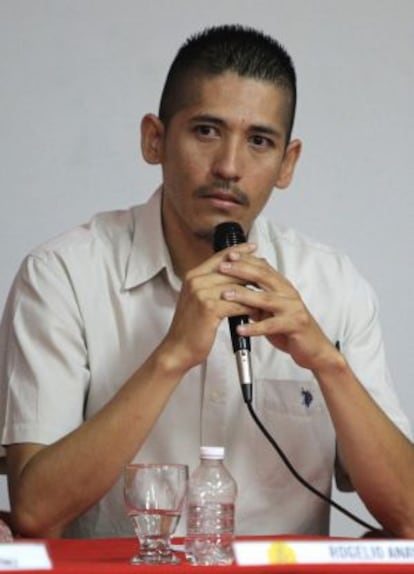Mexico struggles to eradicate torture
Reports of abuse have decreased under Peña Nieto but UN says cases still go unpunished


Four years later, he is back in front of the cameras. Tall and gaunt with his chin up, he is wearing a simple short-sleeved shirt. His eyes rove over the 10 or so journalists waiting for him to speak. Rogelio Anaya is 31 years old. On August 13, 2010, Mexican federal police presented him handcuffed, with glazed eyes, to the press. He was accused of carrying out a car bomb attack that killed three people and left seven injured in Ciudad Juárez. A video of his confession was broadcast on the country’s major TV networks after the presentation. Anaya became a pariah. Now, after going through hell, the tables have turned. Mexican authorities have dropped all charges against him and he has filed a lawsuit against them. Amnesty International supports his cause and has presented his case as a paradigm of confessions elicited under torture – a practice the organization says is common among Mexican military and police officials. The claim is nothing new. Juan Méndez, United Nations Special Rapporteur on Torture, recently condemned these abuses as an “endemic situation” in the country. Anaya, who is married and has two children, agrees with the description.
“I am a survivor and I ask that they clear my name,” he says. He takes a deep breath before speaking. He is making an obvious effort to compose himself as he remembers how, after he was arrested based on a tip-off to police from an anonymous caller, he was thrown into a whirl of horror: beatings, electric shocks, asphyxiation with a plastic bag, and tehuacanazo – a method that involves forcing sparkling water up the victim’s nose. Anaya confessed but did not give himself up completely. He began an exhausting fight against the authorities while still in prison.
In 2013, the Prosecutor General’s Office under President Enrique Peña Nieto promised to drop all charges if there was evidence of torture. After three years in prison, Anaya was freed but his name had been smeared. “The problem is that no police officer was arrested for what they did. And that is normal in this country,” says Amnesty International’s Rupert Knox. According to Knox, Mexico’s National Human Rights Commission received 7,164 torture complaints between 2010 and 2013 and none of them led to a conviction.
I ask that they clear my name,” one torture victim says
The number of complaints over police abuses reached its height under former president Felipe Calderón (2006-2012) when the fight against drug trafficking intensified, leaving more than 70,000 people dead. The new administration has promised to make improvements and reports of abuse have fallen by 30 percent. The Prosecutor General has opened more investigations and the president’s office has publicly condemned these practices. Under international pressure, the Mexican government even acknowledged its own responsibility in such flagrant cases of abuse as that of Ananías Laparra, who was tortured in 1999 and forced to confess to the murder of his daughter’s boyfriend. Authorities also tortured his son to get him to accuse his father. Although he was innocent, Laparra spent 12 years in prison. On Friday, the Mexican government organized an event to offer him a formal apology.
“Normally no officers get arrested,” says Amnesty International. Experts, however, say such gestures are not enough to stop this phenomenon because it is protected with impunity. “There is a judicial system that neither investigates, nor sanctions,” Ernesto López Portillo, president of the Institute for Security and Democracy, says. “But the most disheartening thing is the lack of oversight mechanisms – something that is especially serious because torture is carried out by the authority that would have to investigate it.”
According to Portillo, these factors generate a black hole that conceals the abuses. And the victims who come to light get a rough ride. Yuly Baltazar Martínez knows this well. She is a 34-year-old Honduran woman whose husband, Ángel Colón, a human rights activist, tried to enter the United States to find work because their first-born son was sick with cancer. He contacted a coyote human smuggler in Tijuana and, while waiting at the guide’s home, was arrested. Up until this point, their story is a familiar border tale. But, according to Amnesty International, the police took it further. Instead of deporting him, they tortured him and forced him to confess to belonging to a gang. And Colón, a poor immigrant black man, ended up in prison.
Five years have now gone by and many things have happened. Some of them were public; others unfolded behind closed doors. Colón has maintained his innocence and Amnesty International has declared him a prisoner of conscience. Honduras has spoken out in his defense. His sick son Ángel died without his father by his side and it was only last Monday that he saw his wife again after five years inside.
Translation: Dyane Jean François
Tu suscripción se está usando en otro dispositivo
¿Quieres añadir otro usuario a tu suscripción?
Si continúas leyendo en este dispositivo, no se podrá leer en el otro.
FlechaTu suscripción se está usando en otro dispositivo y solo puedes acceder a EL PAÍS desde un dispositivo a la vez.
Si quieres compartir tu cuenta, cambia tu suscripción a la modalidad Premium, así podrás añadir otro usuario. Cada uno accederá con su propia cuenta de email, lo que os permitirá personalizar vuestra experiencia en EL PAÍS.
En el caso de no saber quién está usando tu cuenta, te recomendamos cambiar tu contraseña aquí.
Si decides continuar compartiendo tu cuenta, este mensaje se mostrará en tu dispositivo y en el de la otra persona que está usando tu cuenta de forma indefinida, afectando a tu experiencia de lectura. Puedes consultar aquí los términos y condiciones de la suscripción digital.








































